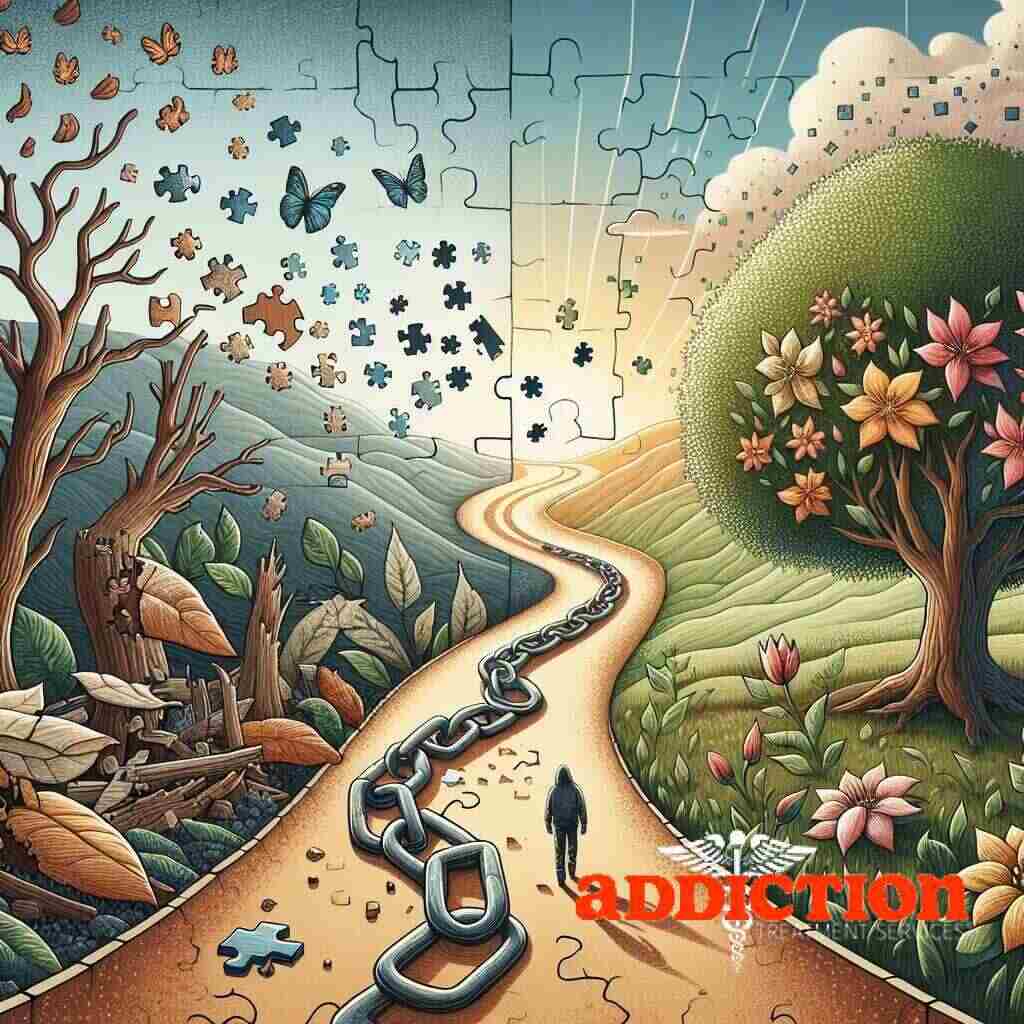 Posted On: 05/03/2024
Posted On: 05/03/2024Understanding Family Therapy in Addiction Recovery
The role of family therapy in addiction treatment services
Family therapy plays a crucial role in the holistic approach to addiction recovery. It is an essential component that many addiction treatment services integrate into their programs. The primary goal is to address the underlying issues not just within the individual suffering from substance use disorders but also within the family system that might contribute to the addiction. Involving family members in therapy sessions provides a unique opportunity for everyone affected by the addiction to come together, share their experiences, and begin the healing process collectively.
Family therapy in addiction treatment services aims to educate family members about the nature of addiction, help them develop healthier communication skills, and instill effective strategies for supporting their loved one’s recovery journey. This form of therapy acknowledges the interconnectedness of family dynamics and addiction, emphasizing that recovery is a communal effort.
Breaking down substance use disorders family therapy
Substance use disorders family therapy is designed to dissect the complex family dynamics that often surround addiction. Therapists skilled in addiction recovery family support networks help families explore patterns of behavior that may contribute to or exacerbate the addiction. This involves breaking down the roles each family member plays in the dynamics of substance abuse.
For instance, some family members might unknowingly adopt an enabling role, while others might become distant or overly critical. By identifying and understanding these roles through substance use disorders family therapy, families can start to shift towards more supportive behaviors that encourage healing rather than perpetuate the cycle of addiction. The process includes working through denial, guilt, shame, and anger, which are common emotions in families dealing with substance misuse.
How family involvement enhances the recovery process
Family involvement is a cornerstone of successful addiction recovery. When families actively partake in therapy sessions and recovery programs, they not only provide essential support to their loved one but also undergo transformative healing themselves. Through guided family counseling for substance abuse, families learn to improve communication, set healthy boundaries, and rebuild trust that may have been eroded by addiction.
Moreover, family involvement in the recovery process fosters a supportive home environment, crucial for long-term recovery. Family members gain insights into the challenges of addiction and the importance of patience, understanding, and unconditional support. This collaborative approach to addiction recovery emphasizes that while the journey may be fraught with challenges, the supportive foundation of a family can significantly influence a positive outcome. Engaging in therapy together strengthens the family unit, equipping it to navigate the complexities of recovery and minimizing the risk of relapse.
Family therapy in addiction recovery not only assists in healing the individual but also renews and strengthens family bonds, making it an indispensable element of comprehensive addiction treatment services.
Foundations of Family Therapy in Substance Abuse Treatment
Family dynamics in addiction treatment explained
Family dynamics play a pivotal role in both the development and recovery processes of substance use disorders. In the context of addiction therapy services, understanding these dynamics can illuminate how patterns of interaction within the family contribute to the cyclical nature of addiction. Therapists focus on dissecting these patterns to identify negative behaviors and communication gaps that may foster an environment conducive to substance misuse.
Families often exhibit specific roles-like the enabler, the scapegoat, or the hero-that, while well-intentioned, may actually perpetuate the addiction. Recognizing and addressing these roles is crucial. Through therapy, families learn to redefine their interactions and support systems in ways that promote healthy relationships and individual accountability, thereby creating a stronger foundation for the patient’s recovery.
Substance abuse family therapy techniques overview
Substance abuse family therapy incorporates a variety of techniques tailored to address the multifaceted nature of addiction within a family context. Techniques such as Behavioral Family Therapy, Multidimensional Family Therapy, and Family Systems Therapy are commonly utilized to explore and mend the intricate web of family relationships. These modalities help families and individuals identify harmful behavioral patterns and develop constructive communication skills, problem-solving strategies, and coping mechanisms.
One fundamental technique is the use of structured family therapy sessions where members can express feelings and thoughts in a safe and moderated environment. This setting encourages transparency and understanding, allowing for the dismantling of denial systems and the fostering of empathy among family members. Additionally, therapeutic homework assignments may be given to reinforce lessons learned in therapy, promoting ongoing growth outside of the therapy sessions.
The importance of healing family relationships in recovery
Healing family relationships plays a critical role in the effectiveness of substance misuse treatment. Strained relationships can exacerbate stress and emotional turmoil, which may trigger relapse or hinder the recovery process. Conversely, supportive and understanding family relationships can significantly enhance recovery outcomes by providing the individual with a stable support network, emotional security, and encouragement.
In the journey of addiction recovery, repairing the damage to family relationships involves addressing past hurts, rebuilding trust, and establishing new, healthy boundaries. Therapists guide families through this delicate process, helping them to navigate conflicts, communicate effectively, and understand each other’s perspectives. As families heal together, they not only support the individual’s recovery but also foster a healthier, more cohesive family unit that can withstand the challenges of addiction. This holistic approach to recovery emphasizes that the health of the family as a whole is instrumental in the successful treatment of substance use disorders.
Family Engagement in Addiction Treatment Programs
Navigating family-based therapy for addiction
The journey through addiction recovery is profoundly personal, yet the inclusion of family-based therapy offers a communal path toward healing and understanding. Navigating the intricacies of family dynamics within the context of addiction therapy requires patience, openness, and a willingness to confront painful truths. A family psychotherapy approach aims to untangle the web of communication barriers, unresolved conflicts, and deep-seated emotional wounds that often accompany substance misuse. By participating in structured family therapy sessions, members engage in a shared experience of growth and recovery, learning to listen, express, and empathize with one another in ways that may have seemed impossible before. This collaborative form of therapy enhances emotional bonds, fosters a deeper understanding of addiction as a disease, and cultivates a supportive environment crucial for the individual’s recovery journey.
Addiction treatment centers family programs structure
Addiction treatment centers increasingly recognize the value of incorporating family programs into their recovery curriculum, offering a structured framework designed to facilitate healing and support for both the individual and their loved ones. The structure of these addiction rehabilitation centers family programs typically includes a combination of group sessions, individual counseling, and educational workshops. These components are meticulously crafted to break down the addiction dynamics within families, providing the tools and knowledge necessary to rebuild healthier relationships. Family members are encouraged to actively participate in therapy sessions where they can share their experiences, fears, and hopes in a safe and supportive setting. Such programs not only aim to facilitate the recovery process but also empower families to become a pillar of support, understanding, and love for their recovering members.
Maximizing family support in substance abuse treatment
Maximizing family support in substance abuse treatment is pivotal for enhancing the recovery trajectory of individuals struggling with addiction. The foundation of successful recovery often rests on the strength and stability of one’s support system, where family plays an indispensable role. Efforts to engage families in the recovery process must go beyond the boundaries of traditional therapy sessions, extending into the everyday lives of those affected by addiction. Education plays a crucial role,by understanding the signs of substance withdrawal, recognizing triggers, and learning relapse prevention strategies, families can become proactive participants in their loved one’s recovery journey. Additionally, creating open channels of communication and setting clear, healthy boundaries can significantly alleviate the stress and tension often present in households dealing with addiction. Support groups and educational resources specifically designed for family members of substance users can further enhance understanding and empathy, making it possible to create a nurturing, supportive home environment conducive to long-term recovery.
Goals and Benefits of Family Therapy in Recovery

Improving family communication in recovery
One of the primary goals of family therapy in addiction recovery is to improve communication within the family unit. Substance use disorders can often lead to misunderstandings, conflicts, and a breakdown in communication. Family therapy aims to bridge these gaps by teaching family members how to express their thoughts and feelings effectively and listen to each other without judgment. This involves learning new skills such as active listening, empathy, and open-ended questioning. As families become more adept at communicating, they can better support their loved one in recovery, addressing issues constructively and offering encouragement and understanding. By fostering a more open and honest communication environment, families can strengthen their relationships, creating a more supportive atmosphere conducive to recovery. Enhanced communication skills are integral, not just during the initial recovery phase but as ongoing tools that families can use to maintain healthy relationships and support addiction treatment services near me.
Strengthening relapse prevention through family support
Family therapy in addiction recovery also plays a vital role in strengthening relapse prevention strategies. With the involvement of family members in the recovery process, individuals have a better chance at maintaining long-term sobriety. During family therapy sessions, families learn about the warning signs of relapse, triggers, and how stress within the family dynamic can impact recovery. Through education and open discussion, families become empowered to support their loved one in developing healthy coping mechanisms and making positive life changes. Therapists guide families in creating a relapse prevention plan that includes clear steps and strategies for both the individual and family members to follow. This collaborative approach not only reinforces the individual’s commitment to sobriety but also instills a collective responsibility within the family, enhancing the overall stability and resilience of the recovery journey.
Building a supportive environment for early intervention and recovery
Creating a supportive home environment is crucial for the success of early intervention and the ongoing recovery process. Family therapy assists in establishing a nurturing and positive home atmosphere where individuals feel safe and supported in their journey towards sobriety. This includes working on resolving conflicts, implementing healthy family routines, and establishing boundaries that respect everyone’s needs. A supportive home environment also means removing any substance-related paraphernalia, understanding the importance of sober living spaces, and encouraging healthy lifestyle choices. By actively participating in family therapy sessions, family members learn to foster an environment that discourages substance misuse and promotes well-being, accountability, and personal growth. As families become more involved and supportive, they lay the foundation for a stable recovery, making it easier for their loved one to focus on their rehabilitation goals and reduce the risk of relapse. Engaging in recovery programs and utilizing resources such as intensive outpatient programs can further enhance the support system available to individuals and their families.
Approaches and Models of Family Therapy in Addiction Recovery
Comparing family therapy approaches in addiction
Family therapy in the realm of addiction treatment can vary widely in approach, each tailored to address specific family dynamics, clinical needs, and stages of recovery. Cognitive Behavioral Therapy (CBT) focuses on identifying and altering negative thoughts and behaviors within the family unit that contribute to the cycle of addiction. On the other hand, Structural Family Therapy aims to reorganize family structures and hierarchies to support healthier interactions and boundaries. Another approach, Systemic Family Therapy, looks at the family as a whole system, working to address issues that transcend individual behaviors and affect the entire family dynamic. Comparing these approaches reveals a spectrum of techniques, from focusing on the individual within the family context with CBT, to addressing family organization with Structural Therapy, and finally, considering the broader systemic interactions with Systemic Therapy. Understanding the nuances of each approach can empower families and therapists to choose the most effective pathway for addressing substance misuse and fostering long-term recovery.
Effective family therapy models in addiction recovery
Several models of family therapy have shown effectiveness in the context of addiction recovery. The Bowenian Family Therapy model emphasizes understanding and resolving multigenerational transmission of patterns that contribute to addiction, promoting differentiation and individuality within the family structure. Another impactful model is the Multidimensional Family Therapy (MDFT), which is often applied to adolescent substance use disorders. MDFT integrates aspects of individual psychology, family systems, and external systems such as peers and schools. It’s designed to improve the functioning of each member within the family system as well as the system as a whole. The Family Systems Model is also widely used, focusing on the family as an interconnected system where changes in one member’s behavior can affect the entire system. These models offer varied lenses through which to view and treat addiction, catering to different family needs and circumstances, ultimately aiming to heal not just the individual but the family as a whole.
Integrating substance abuse family education in treatment
Incorporating family education into addiction recovery programs is essential for creating a well-rounded treatment approach. Substance abuse family education provides crucial information about the addiction definition, the impacts of substance misuse on the brain and behavior, and the recovery process. It equips families with the knowledge necessary to navigate the complex world of addiction and recovery, fostering a deeper understanding and empathy towards their loved one’s struggles. Programs typically cover topics such as the science of addiction, effective communication strategies, establishing healthy boundaries, and relapse prevention. This educational component, combined with therapy, enhances family roles in addiction therapy, empowering families to become active participants in their loved one’s recovery journey. Through education, families transform from bystanders to invaluable allies in the fight against addiction, better prepared to support their loved one and themselves.
The Impact of Family Roles in Addiction Recovery
Understanding addiction recovery family roles
In the context of addiction recovery, family roles undergo a significant examination as they play pivotal roles in shaping the dynamics of substance misuse and rehabilitation processes. When a family member struggles with addiction, various roles emerge within the family structure, including the enabler, hero, scapegoat, lost child, and mascot. Each role, while distinct, serves as a coping mechanism for dealing with the stress and chaos addiction introduces into the family system. Recognizing these roles is the first step in enhancing family roles in addiction therapy, as it allows families to understand how their interactions and behaviors may inadvertently sustain the addiction cycle. By addressing these roles within the safe confines of family therapy sessions, families can begin to dismantle harmful patterns and adopt a more supportive stance towards recovery.
The transformation of family roles throughout the recovery journey
As individuals progress through addiction recovery, the transformation of family roles becomes not only evident but essential. Initially, family members might find themselves entrenched in roles that contribute to the dysfunction within the home. However, through targeted family therapy sessions, these roles can evolve to promote healing and recovery. The enabler might transform into a pillar of accountability, encouraging responsibility rather than rescuing the addict from the consequences of their actions. The hero, often taking on undue responsibility to compensate for the family’s struggles, can learn to focus more on their well-being, understanding that self-care is not selfish but necessary for the family’s overall health.
Furthermore, the scapegoat, who acts out in response to the family’s stress, can learn more constructive ways to express feelings, while the lost child, often withdrawn, can be encouraged to engage more with the family. This transformation of roles underlines the importance of adaptability and change as central tenets of recovery, demonstrating that the family, as a unit, can shift towards healthier interactions and support systems.
Empowering family members through addiction recovery services
Empowering family members through addiction recovery services extends beyond mere participation in therapy sessions. It involves providing them with the tools, education, and resources needed to understand addiction’s complexities and how best to support their loved one’s journey to sobriety. This empowerment can come in many forms, from educational programs that delve into the science of addiction and recovery processes to support groups designed specifically for families dealing with addiction.
In these environments, family members learn the importance of setting boundaries, the art of effective communication, and the necessity of caring for their mental and emotional well-being alongside supporting their loved one. Engaging in shared recovery programs or family workshops can further strengthen this sense of empowerment, fostering a collective resolve to navigate recovery together. As families become more informed and involved, their capacity to aid in their loved one’s recovery journey-and to heal as a unit-significantly increases, illustrating the transformative power of knowledge and engagement in the realm of addiction recovery.
Challenges and Solutions in Family Therapy for Addiction
Addressing common challenges in family counseling for substance abuse
Family therapy in the context of addiction treatment presents unique challenges. One prevalent issue is resistance from family members who may feel apprehensive about discussing personal matters in a therapy session. Overcoming this resistance involves creating a supportive and non-judgmental environment where each member feels seen and heard. Another challenge is the deep-seated emotional pain and resentment built over years of substance misuse within the family. Therapists often utilize empathetic listening and mediation techniques to guide families through the process of expressing these difficult emotions in a constructive manner.
Misunderstandings about the nature of addiction can also serve as a barrier to effective family therapy. Educating families about substance misuse as a complex brain disorder rather than a moral failing is crucial. This knowledge fosters a more compassionate and understanding approach to recovery, shifting the family’s perspective from blame to support. Lastly, managing different family members’ expectations for recovery can be challenging, as everyone may have a different idea of what success looks like. Here, setting realistic goals and having open discussions about the recovery process are essential to align family members’ expectations and support the individual’s journey towards sobriety.
Tailored family therapy interventions in addiction
Family therapy for addiction requires a personalized approach to effectively address the unique dynamics and issues within each family. Tailored interventions might include intensive therapy sessions focused on unresolved traumas that contribute to the substance misuse and strained family relationships. Such intensive therapy can provide a deep dive into the underlying issues, facilitating a healing process that might be more challenging to achieve in standard therapy settings.
Moreover, involving the entire family in the treatment plan can significantly enhance the efficacy of the intervention. This might involve structured activities and therapies designed to improve communication, rebuild trust, and develop healthy coping mechanisms for stress and conflict. For families dealing with highly specific issues, such as co-occurring mental health disorders, tailored interventions might also include specialized educational sessions about managing these challenges alongside the recovery process.
Incorporating experiential therapies, such as art or music therapy, can offer new ways for family members to express their feelings and connect with one another on a deeper level. These therapies can be particularly beneficial in reaching younger family members who might struggle to articulate their experiences and emotions in traditional talk therapy contexts.
Fostering resilience and understanding within family units
Building resilience within families facing addiction involves strengthening the family’s ability to cope with stress, change, and adversity in healthy ways. This includes developing a shared understanding of addiction as a disease that affects the entire family, not just the individual struggling with substance misuse. Family therapy sessions aim to cultivate empathy among family members, encouraging them to see the world from each other’s perspectives and support one another more effectively.
Additionally, fostering understanding involves teaching families about the importance of self-care and setting boundaries. Family members often neglect their own well-being while trying to support their loved one, leading to burnout and resentment. Encouraging individual self-care practices and establishing clear boundaries can help maintain the family’s mental and emotional health throughout the recovery journey.
Creating a family resilience plan is another vital component of family therapy. This plan might include strategies for dealing with potential relapses, stress management techniques for each family member, and plans for family activities that promote bonding and mutual support. By focusing on resilience and understanding, family therapy can transform the family unit into a source of strength and stability for the individual in recovery, paving the way for healing and lasting sobriety.
Case Studies: Family Therapy Success Stories
Healing and reconnecting: A journey through family therapy
In the sphere of addiction recovery, the story of the Thompson family stands as a beacon of hope and transformation. Initially torn apart by the ravages of drug addiction, the family sought help through an intensive family therapy program. Their journey began with acknowledging the pain and discord that addiction had sown among them. Each therapy session was approached as a step towards understanding, healing, and ultimately, reconnection.
The family therapy was meticulously designed to dismantle the walls of resentment and blame built over years. By employing techniques such as role-playing and open communication exercises, family members were able to express their buried feelings in a controlled and therapeutic environment. This process facilitated a deeper understanding among family members, allowing them to see the person behind the addiction and the pain it had inflicted on everyone.
Through months of intensive therapy, the Thompsons learned the importance of forgiveness, both of themselves and each other. The journey was not without its challenges,however, the shared goal of healing kept them motivated. By the program’s end, not only had their loved one made significant strides in recovery from substance misuse, but the family had also rekindled their bond, stronger and more resilient than ever.
Learning and growing together: The power of family dynamics in recovery
The Martins’ story is a testament to the power of adapting and growing through the challenges of addiction recovery. When their eldest son, Michael, entered a substance misuse rehab, they felt a mixture of relief and overwhelming concern. It was the structured family therapy sessions at the rehab center that opened their eyes to the role they played in Michael’s addiction and recovery journey.
Through guided discussions and family therapy exercises, the Martins confronted uncomfortable truths about their family dynamics. They discovered how their communication patterns had contributed to a lack of understanding and emotional support for Michael. These sessions offered them a new perspective, emphasizing the significance of open, honest communication and unconditional support in fostering a conducive environment for recovery.
With each session, the family grew closer, learning to navigate the complexities of addiction together. The experience equipped them with skills to maintain a healthy, supportive home environment, critical for Michael’s ongoing recovery. Their story highlights the transformative impact of understanding and adjusting family dynamics in the recovery process, making them a stronger, united front against the challenges of addiction.
Bridging gaps: How family engagement transforms addiction treatment
The Lopez family’s experience underscores the transformative potential of family engagement in addiction treatment. Faced with Maria’s long battle with substance addiction, the family felt fragmented, with each member coping in isolation. The turning point came when they participated in a comprehensive addiction treatment program that emphasized family therapy as a core component.
Family therapy sessions became the linchpin for bridging the emotional and communication gaps that had widened over years of Maria’s substance misuse. By engaging in these sessions, the family discovered the power of collective healing. They learned to communicate more effectively, express their needs and frustrations without fear of judgment, and most importantly, to listen empathetically to one another.
This family’s story illuminates the critical role that family involvement plays in the recovery process. Their engagement in Maria’s treatment journey facilitated a newfound understanding and compassion among family members, laying a solid foundation for Maria’s continued recovery and the family’s collective healing. It exemplifies how family therapy not only aids the individual in recovery but also mends and strengthens the family unit itself, making it an indispensable element of addiction treatment.
Finding the Right Addiction Treatment Family Services
Locating Addiction Treatment Centers Offering Family Therapy
Finding the right addiction treatment center that offers comprehensive family therapy services is a critical step in the healing journey for individuals and their loved ones. Recognizing the integral role family plays in the recovery process, it’s essential to seek out facilities that incorporate family into the treatment plan from the onset. This involves researching centers that emphasize family involvement and verifying their commitment to including family therapy as part of their recovery approach. Resources such as the addiction treatment services directory can be an invaluable tool, providing insights into the programs that provide specialized family therapy services. Additionally, exploring testimonials and reviews from families who have gone through the program can offer firsthand perspectives on the effectiveness of the family therapy provided.
Utilizing the Addiction Treatment Services Directory for Family Programs
The addiction treatment services directory functions as a pivotal resource for families navigating the complexities of finding appropriate treatment centers. This directory allows users to filter search results based on specific treatment needs, including family therapy options, locations, and types of addiction treatment available. By utilizing this directory, families can quickly identify centers that prioritize family involvement in the recovery process, ensuring that their loved one receives the holistic support necessary for a successful recovery journey. The directory also offers detailed profiles of each treatment center, outlining their philosophy toward family engagement, the types of family therapy sessions offered, and the qualifications of the therapy practitioners. This information aids families in making informed decisions about which program best suits their needs, facilitating a smoother transition into the recovery phase for both the individual struggling with substance use disorders and their family members.
Criteria for Choosing the Best Family Engagement in Addiction Treatment Centers
Selecting an addiction treatment center with optimal family engagement involves several key criteria. First and foremost, the center should offer a range of family therapy modalities, tailored to address the complex dynamics of addiction and its impact on family relationships. This includes assessing the qualifications and experience of the therapy staff in conducting family therapy sessions. Look for centers that provide evidence of specialized training in family dynamics related to addiction and recovery. Another crucial factor is the center’s approach to integrating family members into the treatment process. The best centers recognize the family as a partner in recovery, facilitating open communication between the patient, family members, and therapy professionals.
Additionally, consider the logistical aspects of family engagement, such as the frequency of therapy sessions, the provision of family education programs, and the availability of ongoing support for family members post-treatment. Evaluating the center’s commitment to family inclusion at every stage of the recovery process is essential. Finally, assess the treatment center’s overall philosophy and values to ensure they align with the family’s expectations and needs. Factors such as respect for the patient and family’s autonomy, a non-judgmental environment, and a comprehensive understanding of the recovery journey’s challenges are indicative of a program well-suited for fostering robust family engagement. By carefully considering these criteria, families can select an addiction treatment center that not only supports the individual’s recovery but also empowers the family as a whole.
Every family’s journey towards recovery is unique, and the role of effective family therapy in this process cannot be overstated. Ensuring that the treatment center aligns with the family’s needs and values is crucial for the success of both the individual and the family unit in overcoming the challenges associated with substance use disorders.
Empowering Your Family in the Journey to Recovery

Recovery from addiction is a path best navigated with support, understanding, and a collective commitment from the family unit. It’s a journey not just of the individual struggling with substance use disorders but of every family member willing to support them through thick and thin. Empowering families plays a pivotal role in enhancing the recovery process, providing the necessary tools, resources, and emotional scaffolding to rebuild lives together.
Taking the first step together with addiction treatment services near me
The journey towards recovery often begins with the crucial first step of acknowledging the need for help – both for the individual battling addiction and their family. Locating addiction treatment services near you offers a gateway to a myriad of resources designed to support families in this critical phase. These initial steps involve understanding the nature of addiction, recognizing how it impacts family dynamics, and exploring treatment options that include family therapy. By choosing an addiction treatment center that incorporates family into the recovery process, you ensure that everyone embarks on this journey together, laying a solid foundation for healing, growth, and eventual recovery.
Building a network of recovery support services for families
A robust support network is indispensable in the realm of addiction recovery. Beyond the immediate family, engaging with broader recovery support services can provide additional layers of guidance, understanding, and resilience for families navigating the complexities of recovery. This network might include sober living guides to assist in finding the right sober living environment post-treatment, or participating in community support groups such as Alcoholics Anonymous (meetings finder or Narcotics Anonymous (meetings locator. These resources offer valuable educational materials, emotional support, and practical advice, enabling families to build a comprehensive support system that strengthens their capacity to support their loved one’s recovery journey.
Celebrating milestones and sustaining recovery as a family unit
Recognizing and celebrating milestones in the recovery journey plays a crucial role in sustaining long-term recovery. These moments, whether they mark one month or one year of sobriety, serve as powerful reminders of the progress made and the collective effort of the family and the individual. Celebrating these achievements reinforces positive behaviors and strengthens the family’s commitment to the recovery process. Furthermore, sustaining recovery as a family unit involves continuous engagement with therapy, support groups, and creating an environment conducive to sobriety. It means maintaining open lines of communication, reinforcing healthy boundaries, and being vigilant for signs of potential relapse. By actively participating in the recovery journey, families not only provide invaluable support to their loved one but also embark on a path of healing and growth themselves, reinforcing the idea that recovery is indeed a shared voyage.
The journey to recovery is a testament to the power of love, support, and understanding within the family unit. By taking the first steps together, building a strong network of recovery support, and celebrating each milestone, families can navigate the challenges of addiction recovery, fostering an environment where healing and growth thrive. Through these efforts, families emerge not only stronger but more united, having transformed the trials of addiction into a testament to resilience, hope, and the enduring strength of familial bonds.
Frequently Asked Questions
Question: How does family therapy in addiction recovery contribute to the overall success of a treatment program?
Answer: Family therapy plays a pivotal role in the holistic approach to addiction recovery, addressing not just the individual suffering from substance use disorders but the entire family dynamic which can significantly influence the course of treatment. At Addiction Treatment Services, we acknowledge the interconnectedness of family relationships and addiction recovery. By integrating family therapy into our addiction treatment services, we offer a comprehensive recovery strategy that educates family members, improves communication skills, and fosters a supportive environment essential for long-term success. This approach ensures that all involved are equipped with the strategies and understanding needed to support their loved one’s journey to sobriety, making family therapy an indispensable element of effective addiction treatment plans.
Question: What types of family-based therapy for addiction do Addiction Treatment Services recommend?
Answer: At Addiction Treatment Services, we endorse a variety of family-based therapy approaches tailored to meet the complex needs of families dealing with substance misuse. These include Behavioral Family Therapy, Multidimensional Family Therapy, and Family Systems Therapy, among others. Our recommended addiction treatment centers employ these substance abuse family therapy techniques to mend the intricate web of relationships, enabling families to identify harmful patterns, establish healthy boundaries, and foster an environment conducive to recovery. Through the addiction treatment services directory on our website, families can find programs that specialize in these models, ensuring they receive the most effective support tailored to their unique circumstances and needs.
Question: In the context of ‘What Is Family Therapy in Addiction Recovery’, how does Addiction Treatment Services facilitate family involvement in recovery?
Answer: Within the framework of ‘What Is Family Therapy in Addiction Recovery’, Addiction Treatment Services plays a crucial role in facilitating family involvement through a carefully selected network of addiction treatment centers and family programs. These programs are structured to include not only the individual in recovery but also their family members, providing group sessions, individual counseling, and educational workshops. By engaging in these sessions, families learn to navigate the complexities of addiction, communicate effectively, and rebuild trust. Our directory of addiction treatment services near you is designed to connect you with these specialized programs, ensuring that family involvement is a cornerstone of the recovery process, enhancing outcomes, and fostering a supportive home environment crucial for long-term recovery.
Question: Can you explain how strengthening family communication can aid in the recovery process?
Answer: Strengthening family communication is essential in the addiction recovery process as it directly impacts the ability of families to support their loved ones effectively. Improved communication fosters a supportive environment that can significantly facilitate healing and recovery. At Addiction Treatment Services, our network includes addiction treatment centers that offer family counseling for substance abuse, focusing on enhancing communication skills such as active listening, empathy, and constructive feedback. Through these sessions, families learn to address conflicts constructively, express their needs and emotions healthily, and understand the challenges faced by their loved ones. This open and honest communication nurtures the trust and cooperation needed for successful recovery, making it a critical goal of family therapy in addiction treatment.
Question: How does Addiction Treatment Services ensure families receive the most appropriate type of family therapy for their situation?
Answer: Addiction Treatment Services ensures families receive the most appropriate type of therapy through our comprehensive addiction treatment services directory, which allows families to filter options based on specific needs, including the types of family therapy available. Our detailed listings include information on the qualifications of therapy staff, the family therapy models utilized, and the specific family services offered. By providing families with access to a wide range of specialized addiction treatment centers, we enable them to make informed decisions about the best fitting program for their unique circumstances. Moreover, our support staff is always available to assist with navigating the options, ensuring that each family connects with services that offer tailored interventions, from addressing multigenerational patterns of addiction to integrating experiential therapies for deeper family connections.


